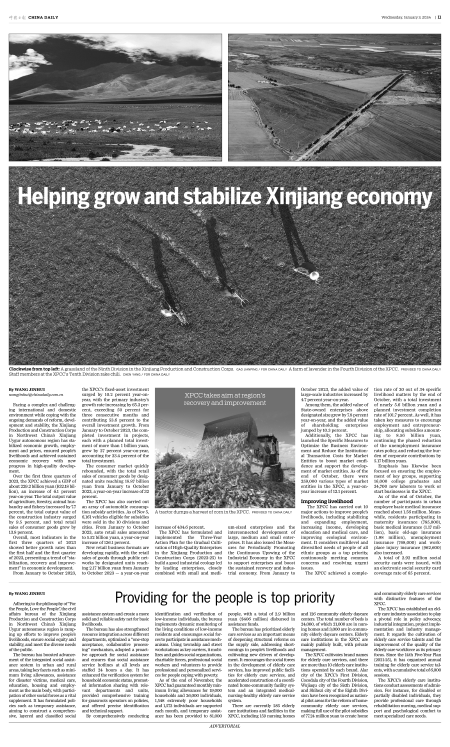Adhering to the philosophy of "For the People, Love the People", the civil affairs bureau of the Xinjiang Production and Construction Corps in Northwest China's Xinjiang Uygur autonomous region is ramping up efforts to improve people's livelihoods, ensure social equity and stability, and meet the diverse needs of the public.
The bureau has boosted advancement of the integrated social assistance system in urban and rural areas, taking key facets such as minimum living allowances, assistance for disaster victims, medical care, education, housing and employment as the main body, with participation of other social forces as a vital supplement. It has formulated policies such as temporary assistance, aiming to construct a comprehensive, layered and classified social assistance system and create a more solid and reliable safety net for basic livelihoods.
The bureau has also strengthened resource integration across different departments, optimized a "one-stop acceptance, collaborative processing" mechanism, adopted a proactive approach for social assistance and ensures that social assistance service hotlines at all levels are staffed 24 hours a day. It has enhanced the verification system for household economic status, promoted information sharing with relevant departments and units, provided comprehensive training for grassroots operators on policies, and offered precise identification and technical support.
By comprehensively conducting identification and verification of low-income individuals, the bureau implements dynamic monitoring of the living conditions of low-income residents and encourages social forces to participate in assistance mechanisms. Using township and street workstations as key carriers, it mobilizes and guides social organizations, charitable forces, professional social workers and volunteers to provide professional and personalized services for people coping with poverty.
As of the end of November, the XPCC had guaranteed monthly minimum living allowances for 19,000 households and 26,000 individuals, 1,548 extremely poor households and 1,573 individuals are supported each month, and temporary assistance has been provided to 81,000 people, with a total of 2.9 billion yuan ($406 million) disbursed in assistance funds.
The bureau has prioritized elderly care services as an important means of deepening structural reforms on the supply side, addressing shortcomings in people's livelihoods and cultivating new drivers of development. It encourages the social forces in the development of elderly care services, has improved public facilities for elderly care services, and accelerated construction of a coordinated home-community facility system and an integrated medical-nursing-healthy elderly care service system.
There are currently 285 elderly care institutions and facilities in the XPCC, including 159 nursing homes and 126 community elderly daycare centers. The total number of beds is 24,000, of which 21,000 are in nursing homes and 3,000 are in community elderly daycare centers. Elderly care institutions in the XPCC are mainly publicly built, with private management.
The XPCC cultivates brand names for elderly care services, and there are more than 10 elderly care institutions operated by each brand. Alar city of the XPCC's First Division, Cocodala city of the Fourth Division, Wujiaqu city of the Sixth Division, and Shihezi city of the Eighth Division have been recognized as national pilot areas for the reform of home-community elderly care services, making full use of the pilot subsidies of 77.24 million yuan to create home and community elderly care services with distinctive features of the XPCC.
The XPCC has established an elderly care industry association to play a pivotal role in policy advocacy, industrial integration, project implementation and industry management. It regards the cultivation of elderly care service talents and the improvement of the quality of the elderly care workforce as its primary focus. Since the 14th Five-Year Plan (2021-25), it has organized annual training for elderly care service talents, with a cumulative total of 6,000 sessions.
The XPCC's elderly care institutions conduct assessments of admission. For instance, for disabled or partially disabled individuals, they provide professional care through rehabilitation nursing, medical support and psychological comfort to meet specialized care needs.

